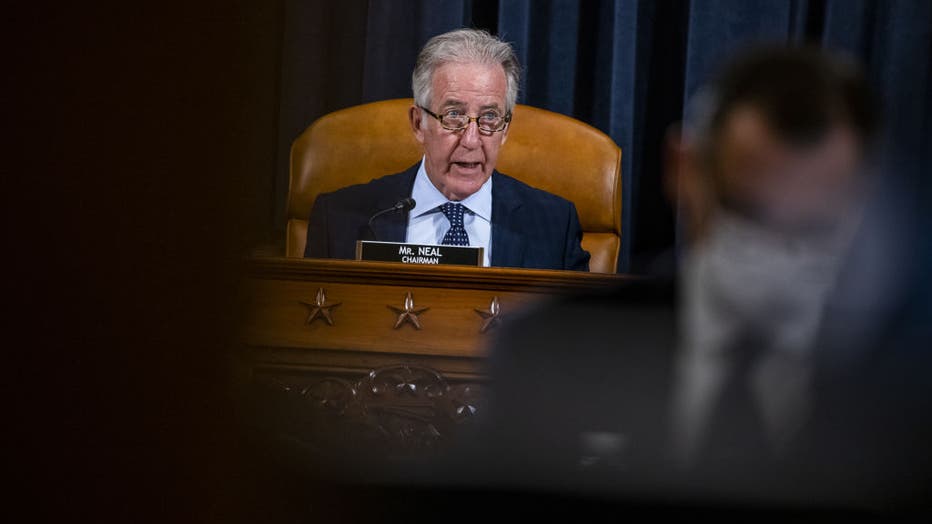House Dems unveil corporate, wealthy tax hikes to fund $3.5T spending plan
WASHINGTON - Congressional Democrats are pushing ahead with President Joe Biden’s $3.5 trillion plan for social and environmental spending — including the unveiling of a sweeping proposal of tax hikes to pay for it — but could still face some headwind in their own party.
Democrats on the House Ways and Means Committee on Monday unveiled the proposal for tax hikes on big corporations and the wealthy to fund the rebuilding plan, which almost all aspects of domestic life.
The proposed top tax rate would revert to 39.6% on couples earning more than $450,000 from the current 37%, and there would be a 3% tax on wealthier Americans making beyond $5 million a year. For big businesses, the proposal would lift the 21% corporate tax rate to 26.5% on incomes beyond $5 million.
In all, the tax hikes are in line with Biden’s own proposals and would bring about the most substantive changes in the tax code since Republicans with then-President Donald Trump slashed taxes in 2017. Business and anti-tax groups are sure to object, but many Democrats are pressing forward.
Rep. Richard Neal, D-Mass., the chairman of the tax-writing Ways & Means Committee, said taken together, the proposals would "expand opportunity for the American people and support our efforts to build a healthier, more prosperous future."
The $3.5 trillion budget is at the heart of Biden’s "Build Back Better" agenda for helping families and combating climate change. The current framework proposes billions for rebuilding infrastructure, tackling climate change and expanding or introducing a range of services, from free prekindergarten to dental, vision and hearing aid care for older people.

FILE - Rep. Richard Neal, a Democrat from Massachusetts and chairman of the House Ways and Means Committee, speaks during a markup of the Build Back Better Act in Washington, D.C., on Sept. 9, 2021. (Credit: Samuel Corum/Bloomberg via Getty Images)
RELATED: Senate’s $3.5T budget: What you need to know
But one Democratic senator has stated opposition to the $3.5 trillion price tag, and Democrats have no votes to spare if they want to pass the president’s massive agenda. The Senate is split 50-50 and Vice President Kamala Harris is the tiebreaker if there is no Republican support.
Sen. Joe Manchin, D-W. Va., suggested the cost will need to be slashed to $1 trillion to $1.5 trillion to win his support. He also cautioned there was "no way" Congress will meet the late September goal from House Speaker Nancy Pelosi, D-Calif., for passage given his current wide differences with liberal Democrats on how much to spend and how to pay for it.
"I cannot support $3.5 trillion," Manchin said Sunday, citing his opposition to a proposed increase in the corporate tax rate from 21% to 28% and vast new social spending. "We should be looking at everything, and we’re not. We don’t have the need to rush into this and get it done within one week because there’s some deadline we’re meeting, or someone’s going to fall through the cracks."
The White House welcomed the preliminary tax plan, which "makes significant progress towards ensuring our economy rewards work and not just wealth," said deputy press secretary Andrew Bates.
"This meets two core goals the President laid out at the beginning of this process -- it does not raise taxes on Americans earning under $400,000 and it repeals the core elements of the Trump tax giveaways for the wealthy and corporations," he said in a statement.
The proposal was pitched as potentially raising some $2.9 trillion, but that’s a preliminary estimate. That would go a long way toward paying for the $3.5 trillion legislation. The White House is counting on long-term economic growth to be sparked by the legislation to generate an additional $600 billion to make up the difference.
Much of the revenue raised would come from the higher taxes on corporations and the highest earners.
Pressed repeatedly about a price tag he could support, Manchin said, "It’s going to be $1, $1.5 (trillion)." He suggested the range was based on a modest rise in the corporate tax rate to 25%, a figure he believes will keep the U.S. globally competitive.
However, Sen. Bernie Sanders, the Vermont independent who chairs the Senate Budget Committee and is helping craft the measure, noted that he and other members of the liberal flank in Congress had initially urged an even more robust package of $6 trillion.
"I don’t think it’s acceptable to the president, to the American people or to the overwhelming majority of the people in the Democratic caucus," Sanders said.
He added: "I believe we’re going to all sit down and work together and come up with a $3.5 trillion reconciliation bill which deals with the enormously unmet needs of working families."
Manchin voted last month to approve a budget resolution that set the figure, though he and Sen. Kyrsten Sinema, D-Ariz., have expressed reservations about the topline amount.
Congressional committees have been working hard this month on slices of the 10-year proposal in a bid to meet a timeline from Pelosi and Senate Majority Leader Chuck Schumer, D-N.Y., to have the bill drafted by Wednesday. Pelosi is seeking a House vote by Oct. 1, near the Sept. 27 timeline for voting on a slimmer infrastructure plan favored by moderate lawmakers.
Manchin, who in an op-ed earlier this month urged a "strategic pause" on the legislation to reconsider the cost, described the timing as unrealistic. He has urged Congress to act first on the $1 trillion bipartisan infrastructure bill already passed by the Senate. But liberal Democrats have threatened to withhold their support until the $3.5 trillion spending bill is passed alongside it.
RELATED: Election overhaul bill: Manchin to break from Democrats and vote against
The Associated Press contributed to this report. It was reported from Cincinnati.

